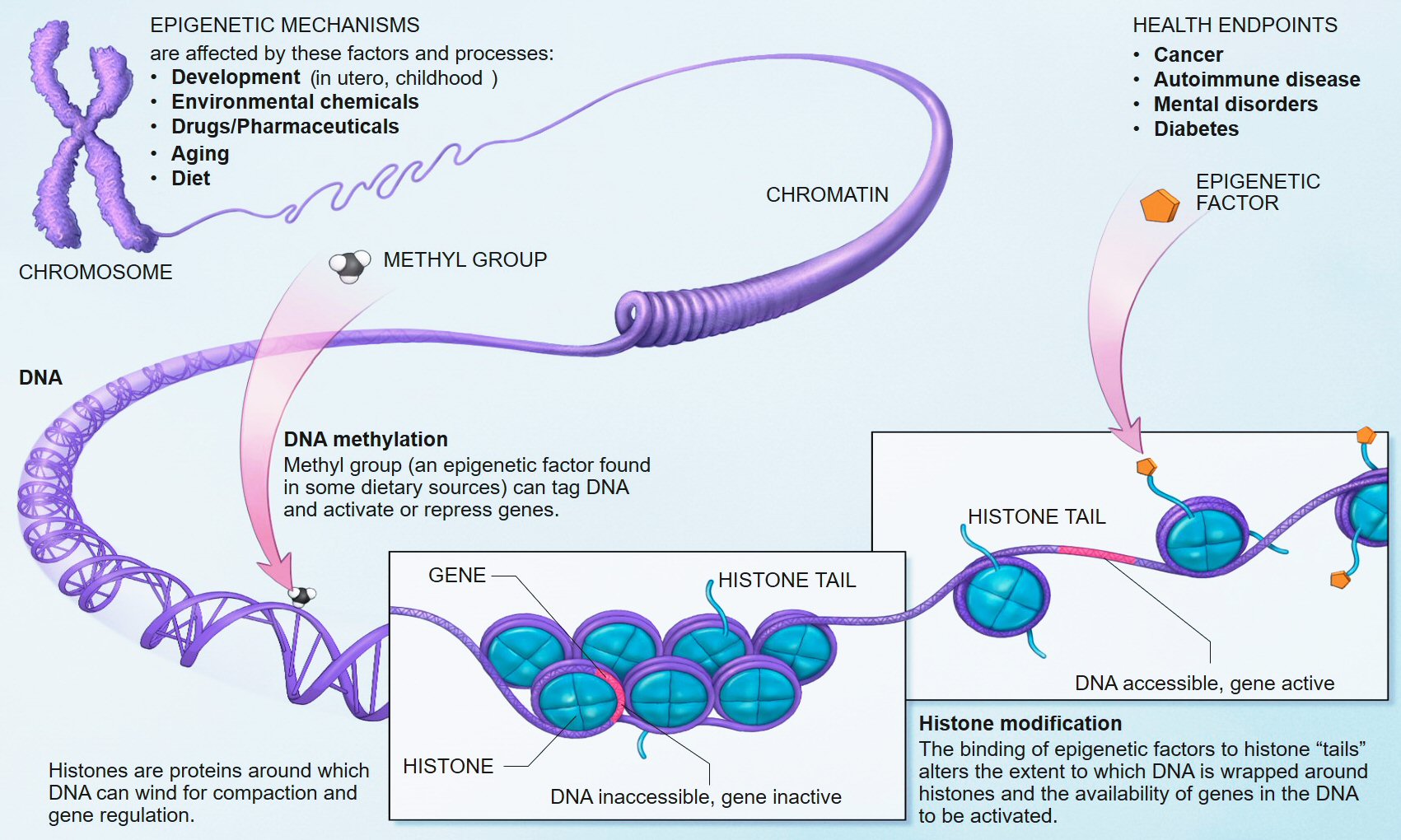
Scientists are beginning to identify some of the environmental influences on genes (epigenetics) that can lead to neuropsychiatric disorders. It's long been clear (to some of us) that this is a better explanatory factor for these disorders than pure heredity.
Epigenetic tie to neuropsychiatric disorders found
Date: July 21, 2014
Source: University of California - Irvine
Summary:DYSFUNCTION in dopamine signaling profoundly changes the activity level of about 2,000 genes in the brain's prefrontal cortex and may be an underlying cause of certain complex neuropsychiatric disorders, such as schizophrenia, according to UC Irvine scientists.
Dysfunction in dopamine signaling profoundly changes the activity level of about 2,000 genes in the brain's prefrontal cortex and may be an underlying cause of certain complex neuropsychiatric disorders, such as schizophrenia, according to scientists. This epigenetic alteration of gene activity in brain cells that receive this neurotransmitter showed for the first time that dopamine deficiencies can affect a variety of behavioral and physiological functions regulated in the prefrontal cortex.
This epigenetic alteration of gene activity in brain cells that receive this neurotransmitter showed for the first time that dopamine deficiencies can affect a variety of behavioral and physiological functions regulated in the prefrontal cortex.
The study, led by Emiliana Borrelli, a UCI professor of microbiology & molecular genetics, appears online in the journal Molecular Psychiatry.
"Our work presents new leads to understanding neuropsychiatric disorders," Borrelli said. "Genes previously linked to schizophrenia seem to be dependent on the controlled release of dopamine at specific locations in the brain. Interestingly, this study shows that altered dopamine levels can modify gene activity through epigenetic mechanisms despite the absence of genetic mutations of the DNA."
Dopamine is a neurotransmitter that acts within certain brain circuitries to help manage functions ranging from movement to emotion. Changes in the dopaminergic system are correlated with cognitive, motor, hormonal and emotional impairment. Excesses in dopamine signaling, for example, have been identified as a trigger for neuropsychiatric disorder symptoms.
Borrelli and her team wanted to understand what would happen if dopamine signaling was hindered. To do this, they used mice that lacked dopamine receptors in midbrain neurons, which radically affected regulated dopamine synthesis and release.
The researchers discovered that this receptor mutation profoundly altered gene expression in neurons receiving dopamine at distal sites in the brain, specifically in the prefrontal cortex. Borrelli said they observed a remarkable decrease in expression levels of some 2,000 genes in this area, coupled with a widespread increase in modifications of basic DNA proteins called histones -- particularly those associated with reduced gene activity.
Borrelli further noted that the dopamine receptor-induced reprogramming led to psychotic-like behaviors in the mutant mice and that prolonged treatment with a dopamine activator restored regular signaling, pointing to one possible therapeutic approach.
The researchers are continuing their work to gain more insights into the genes altered by this dysfunctional dopamine signaling.
Story Source:
The above story is based on materials provided by University of California - Irvine. Note: Materials may be edited for content and length.
Journal Reference:
Brami-Cherrier, K, Anzalone, A, Ramos, M, Forne, I, Macciardi, F, Imhof, A, Borrelli, E. (2014, Jul 15). Epigenetic reprogramming of cortical neurons through alteration of dopaminergic circuits. Molecular Psychiatry; DOI: 10.1038/mp.2014.67
* * * *
Here is the original abstract of the article.
Bagaimana Menarikkan Article Pada Hari Ini . BLUE.Jangan Lupa Datang Lagi Untuk Membaca Article Yang lebih Menarik Pada Masa Akan Datang/Epigenetic reprogramming of cortical neurons through alteration of dopaminergic circuits
K Brami-Cherrier, A Anzalone, M Ramos, I Forne, F Macciardi, A Imhof and E Borrelli
Abstract
Alterations of the dopaminergic system are associated with the cognitive and functional dysfunctions that characterize complex neuropsychiatric disorders. We modeled a dysfunctional dopaminergic system using mice with targeted ablation of dopamine (DA) D2 autoreceptors in mesencephalic dopaminergic neurons. Loss of D2 autoreceptors abolishes D2-mediated control of DA synthesis and release. Here, we show that this mutation leads to a profound alteration of the genomic landscape of neurons receiving dopaminergic afferents at distal sites, specifically in the prefrontal cortex. Indeed, we observed a remarkable downregulation of gene expression in this area of ~2000 genes, which involves a widespread increase in the histone repressive mark H3K9me2/3. This reprogramming process is coupled to psychotic-like behaviors in the mutant mice. Importantly, chronic treatment with a DA agonist can revert the genomic phenotype. Thus, cortical neurons undergo a profound epigenetic reprogramming in response to dysfunctional D2 autoreceptor signaling leading to altered DA levels, a process that may underlie a number of neuropsychiatric disorders.

 2014 Nobel Prize Winners Speak at the University of Arizona
2014 Nobel Prize Winners Speak at the University of Arizona








Posting Komentar
Click to see the code!
To insert emoticon you must added at least one space before the code.